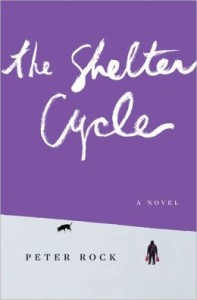The Shelter Cycle
by Peter Rock
Houghton Mifflin Harcourt, 2013
Reviewed by Michael Peck
In "Going Clear," Lawrence Wright explores the phenomenon of blind faith as it pertains to Scientology and that religion’s use of coercion and intergalactic fables to bring members to acquiescence. The inquiry at the center of Wright’s alarming expose – namely, why do otherwise sane individuals put their faith in irrational orthodoxies – is taken up in Peter Rock’s lyrical "The Shelter Cycle." An unsettling portrait of roundabout belief (albeit not of the Scientologist variety) and its existential implications, it could easily serve as an intimate companion to Wright’s exhaustive history.
The religion at the center of "The Shelter Cycle" is that of the real-life Church Universal and Triumphant, in the 1980s. Blending a Scientology-lite litany of supernatural beings (Elementals, Undines, Sylphs) with Cold War hyperbole, the church has built subterranean bunkers near Bozeman to withstand an imminent Russian missile-strike. Two children, Francine and Colville, are born into the church, taking their cues from a woman called the Ascended Master. When the end fails to materialize, the group disbands, stranding many in a world suddenly elided of purpose. Rock’s novel moves back and forth between Francine’s recollections of “how it felt in those days when I was a girl, out in the mountains," and her current life in Boise with her husband Wells.
Delusions and kidnappings permeate "The Shelter Cycle," infusing its examination of insane belief with the veneer of a suspenseful drama. Although the perspective is shared equally among the trio, this is entirely Colville’s and Francine’s drama, and it is Colville’s prodigal return to the underground shelters that provides the book’s linchpin. With stockpiles of Cold War paraphernalia standing in for the bones of the faithful, the shelters are more a sense-deprivation chamber of memories than of any kind of sanctified catacombs meant to stoke the faithful. It is a place, Francine remarks, that “…was the world and the universe, the visible and the invisible, not a country in a state."
But "The Shelter Cycle," while broaching religious themes, is more concerned with the church’s disciples than its doctrines. Rock’s characters are drawn with an unvarnished naturalism that at time seems like creative nonfiction. Taken together with its purposefully awkward dialog, the effect is one of uncanny verisimilitude. The standout passages here are Colville’s utterly believable fanaticism, rendered with such understatement as to be frankly troubling, his treks through the tunnels and eventual, quiet madness at the hands of his unshakable belief. Rock’s world is an unforgiving moral terrain, in relief against an unforgiving literal terrain. It is also, in every way, a classic of understatement. With a discomfiting mood and impartiality reminiscent of Kunzru’s "Gods Without Men," "The Shelter Cycle" does not explore faith head-on, but instead reconnoiters its effects in much more subtle, humanizing ways.
On its surface, "The Shelter Cycle" is a fascinating exegesis of fringe religionists and their struggle to come to terms with their indoctrination. For Colville, this is a schizophrenic and mystical journey that involves a telepathic raccoon and abducting Francine and Wells’s dog (and later their infant). In Francine’s view, though, the shelters are a symbol of her awakening, a way to reenter her history and face down the lingering inculcation of the church’s teachings. Like the unresolved discovery of the missing girl that sets the work in motion, the route to understanding includes many cycles of belief: incredulity, doubt, unreason, and, rarely, sudden enlightenment. Rock’s very sensitive novel spotlights the purpose of faith as an act of putting faith in a purpose, no matter how curious. In the process, it also touches on something deeply pervasive and undoubtedly primeval.
Peter Rock was born and raised in Salt Lake City. His most recent book is "The Shelter Cycle," which concerns the end of the world in Montana in 1990, among other things. His previous novel, "My Abandonment," has won an Alex Award, the Utah Book Award, and been published in Germany, Turkey and France. He is also the author of the novels "The Bewildered," "The Ambidextrist," "This Is the Place," and "Carnival Wolves," and a story collection, "The Unsettling."
Michael Peck's work has appeared in The Believer, The Los Angeles Review of Books, Pank, and elsewhere. His first novel, "The Last Orchard in America," is forthcoming from The 2nd Hand. He lives in Oregon City, where he is a rare bookseller.

